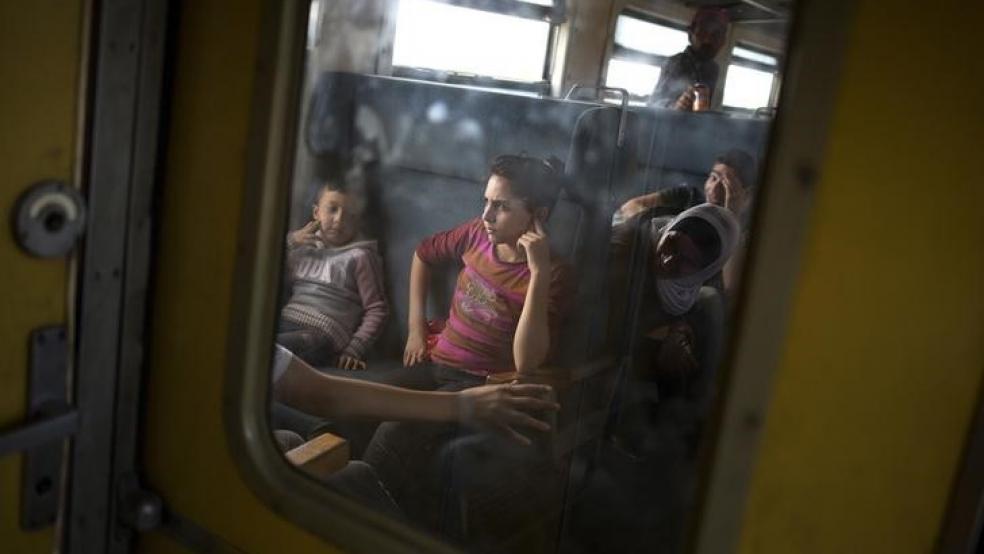STRASBOURG (Reuters) - European Commission President Jean-Claude Juncker will detail a plan to tackle the EU migrant crisis in an annual State of the Union address to the European Parliament in Strasbourg on Wednesday.
Here are elements of existing EU plans and what officials have already indicated Juncker will propose doing next, before an emergency meeting of interior ministers on Monday:BORDER FORCESFollowing the drowning of some 800 people on a single boat off Libya in April, the EU effectively reversed a sharp cutback in warships conducting search and rescue operations; since June, a naval operation has been targeting people-smugglers. Plans to roam far into Libyan waters are on hold, seeking U.N. support.Some EU leaders have suggested a new European border force. Germany, France and Italy proposed an EU management system for the external borders. Juncker is likely to address concerns in northern Europe about leaky southern frontiers.EMERGENCY ASSISTANCEThe EU has paid for food, medicine, shelter and other needs for migrants in countries which have asked for it. Italy and Greece will get nearly half of 2.4 billion euros to help with the crisis over several years. Juncker may propose more funding.RELOCATIONJuncker will renew and enlarge a proposal rejected by states in June for them to take in quotas of asylum-seekers fixed by Brussels. He will propose relocating 160,000 people over two years, up from 40,000, and from Hungary as well as from Greece and Italy. Those who process people's claims to refugee status would receive 6,000 euros per person. Juncker will also propose a permanent mechanism of relocation, modifying the Dublin system by which claims are handled by the first EU state reached.Many governments, especially in the east, have opposed such a scheme, calling it diktat from Brussels and saying it may attract migrants and disrupt societies unused to immigration. However, an attempt to secure voluntary pledges for 40,000 fell short and Germany and France, powerful players in the bloc, have thrown their combined weight behind a mandatory distribution.RESETTLEMENTHaving rejected mandatory national quotas to take in 20,000 refugees direct from U.N. sites outside Europe, states pledged to take 22,000 in total in a two-year pilot scheme. It starts soon and may expand, in cooperation with U.N. agencies who help some 4 million Syrians as well as millions of other refugees.Britain, the bloc's second-biggest economy, is exempt from EU asylum policies but will has said it will take in 20,000 Syrians direct from the Middle East over the next five years.HOTSPOTSAccompanying the relocation of asylum-seekers from Italy and Greece, other EU states will staff "hotspots" in Catania and Piraeus to identify and fingerprint migrants. Northern countries complain that failure to do so has broken EU rules and let many travel over open EU borders to claim asylum in northern Europe.Hungary, which is setting up its own "transit zones" on the border with non-EU Serbia which it has lined with fencing, has said it does not want hotspots - a key part of EU proposals to toughen up and accelerate a process of distinguishing refugees from economic migrants and speed the removal of the latter.DEPORTATIONEconomic migrants whose claims for refugee status fail will be returned home more quickly. The EU is working with countries to ensure they take more people back. Juncker is expected to announce a shared EU list of "safe" states, notably the west Balkan states of Albania, Macedonia, Montenegro, Serbia, Bosnia and Kosovo, as well as Turkey. Their citizens will face a "fast-track" to deportation if they breach EU immigration rules.AIDThe EU will use its development aid budget to reduce poverty and other factors that drive migration, to encourage governments to curb people-smuggling gangs and dissuade their citizens from migrating, and to cooperate with EU deportation procedures. There will be a summit with the African Union in Malta on Nov. 11-12 and with western Balkan countries in the next few weeks.FOREIGN MISSIONSOfficials have steered away from suggestions the EU should set up facilities to process asylum applications in Africa or the Middle East. Among other things, some say they could be vulnerable to attack and hard to manage. However, EU embassies are to have immigration officers to monitor migration trends.The EU is working with international agencies in Niger to inform migrants about to head for Libya of the risks they will run and their low chances of being allowed to settle in Europe.LEGAL MIGRATIONThe EU executive is reviewing schemes to issue EU visas to skilled workers as among the safe routes for immigration. (Additional reporting by Francesco Guarascio; Reporting by Alastair Macdonald; Editing by Alison Williams)Factbox: EU response plans on migration crisis

STOYAN NENOV



